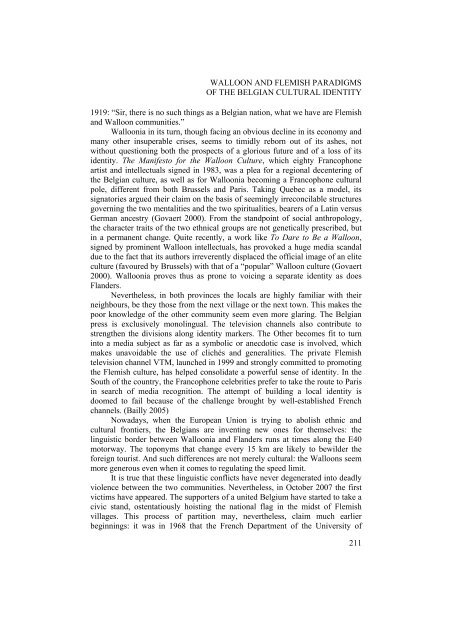culture, subculture and counterculture - Facultatea de Litere
culture, subculture and counterculture - Facultatea de Litere
culture, subculture and counterculture - Facultatea de Litere
Create successful ePaper yourself
Turn your PDF publications into a flip-book with our unique Google optimized e-Paper software.
WALLOON AND FLEMISH PARADIGMS<br />
OF THE BELGIAN CULTURAL IDENTITY<br />
1919: “Sir, there is no such things as a Belgian nation, what we have are Flemish<br />
<strong>and</strong> Walloon communities.”<br />
Walloonia in its turn, though facing an obvious <strong>de</strong>cline in its economy <strong>and</strong><br />
many other insuperable crises, seems to timidly reborn out of its ashes, not<br />
without questioning both the prospects of a glorious future <strong>and</strong> of a loss of its<br />
i<strong>de</strong>ntity. The Manifesto for the Walloon Culture, which eighty Francophone<br />
artist <strong>and</strong> intellectuals signed in 1983, was a plea for a regional <strong>de</strong>centering of<br />
the Belgian <strong>culture</strong>, as well as for Walloonia becoming a Francophone cultural<br />
pole, different from both Brussels <strong>and</strong> Paris. Taking Quebec as a mo<strong>de</strong>l, its<br />
signatories argued their claim on the basis of seemingly irreconcilable structures<br />
governing the two mentalities <strong>and</strong> the two spiritualities, bearers of a Latin versus<br />
German ancestry (Govaert 2000). From the st<strong>and</strong>point of social anthropology,<br />
the character traits of the two ethnical groups are not genetically prescribed, but<br />
in a permanent change. Quite recently, a work like To Dare to Be a Walloon,<br />
signed by prominent Walloon intellectuals, has provoked a huge media sc<strong>and</strong>al<br />
due to the fact that its authors irreverently displaced the official image of an elite<br />
<strong>culture</strong> (favoured by Brussels) with that of a “popular” Walloon <strong>culture</strong> (Govaert<br />
2000). Walloonia proves thus as prone to voicing a separate i<strong>de</strong>ntity as does<br />
Fl<strong>and</strong>ers.<br />
Nevertheless, in both provinces the locals are highly familiar with their<br />
neighbours, be they those from the next village or the next town. This makes the<br />
poor knowledge of the other community seem even more glaring. The Belgian<br />
press is exclusively monolingual. The television channels also contribute to<br />
strengthen the divisions along i<strong>de</strong>ntity markers. The Other becomes fit to turn<br />
into a media subject as far as a symbolic or anecdotic case is involved, which<br />
makes unavoidable the use of clichés <strong>and</strong> generalities. The private Flemish<br />
television channel VTM, launched in 1999 <strong>and</strong> strongly committed to promoting<br />
the Flemish <strong>culture</strong>, has helped consolidate a powerful sense of i<strong>de</strong>ntity. In the<br />
South of the country, the Francophone celebrities prefer to take the route to Paris<br />
in search of media recognition. The attempt of building a local i<strong>de</strong>ntity is<br />
doomed to fail because of the challenge brought by well-established French<br />
channels. (Bailly 2005)<br />
Nowadays, when the European Union is trying to abolish ethnic <strong>and</strong><br />
cultural frontiers, the Belgians are inventing new ones for themselves: the<br />
linguistic bor<strong>de</strong>r between Walloonia <strong>and</strong> Fl<strong>and</strong>ers runs at times along the E40<br />
motorway. The toponyms that change every 15 km are likely to bewil<strong>de</strong>r the<br />
foreign tourist. And such differences are not merely cultural: the Walloons seem<br />
more generous even when it comes to regulating the speed limit.<br />
It is true that these linguistic conflicts have never <strong>de</strong>generated into <strong>de</strong>adly<br />
violence between the two communities. Nevertheless, in October 2007 the first<br />
victims have appeared. The supporters of a united Belgium have started to take a<br />
civic st<strong>and</strong>, ostentatiously hoisting the national flag in the midst of Flemish<br />
villages. This process of partition may, nevertheless, claim much earlier<br />
beginnings: it was in 1968 that the French Department of the University of<br />
211












